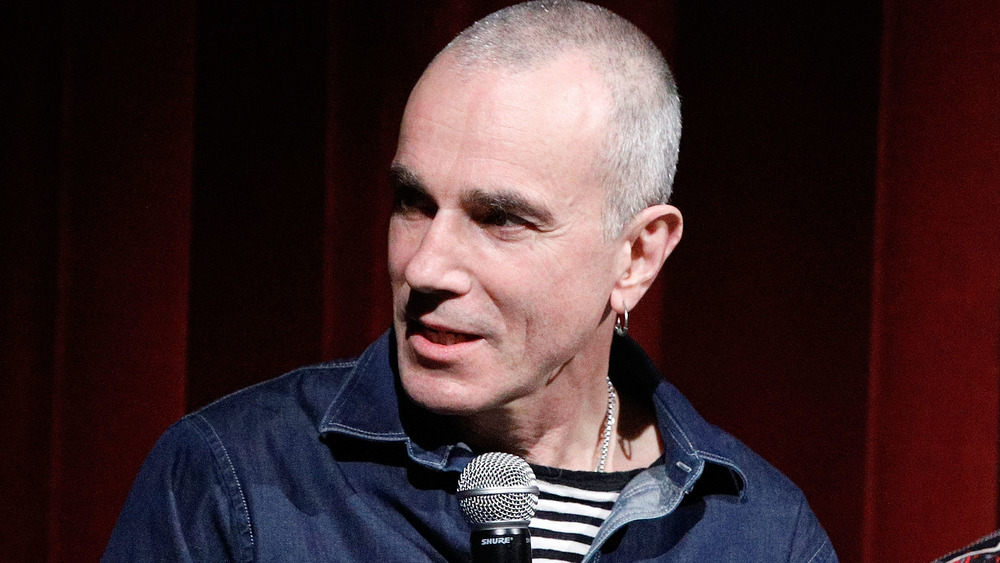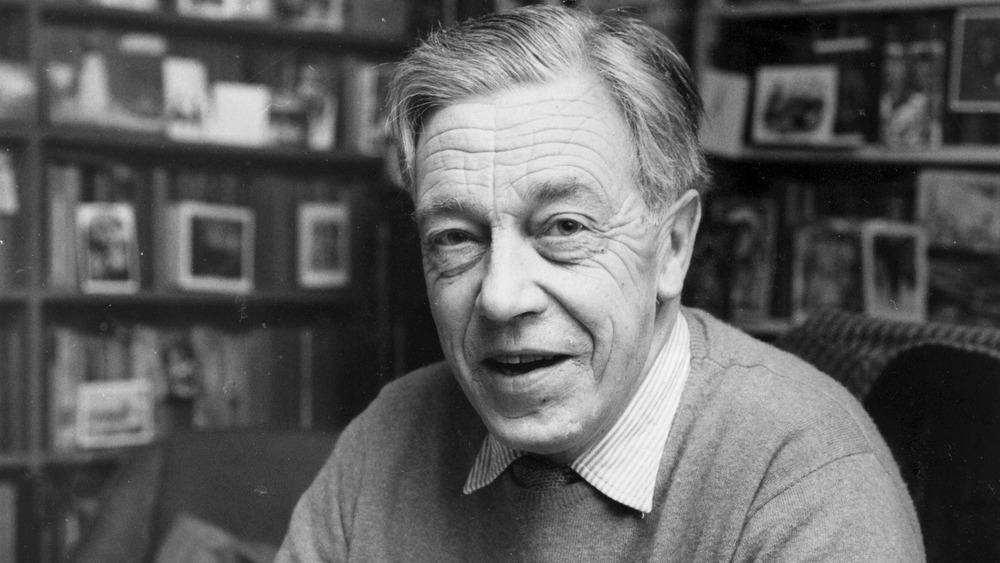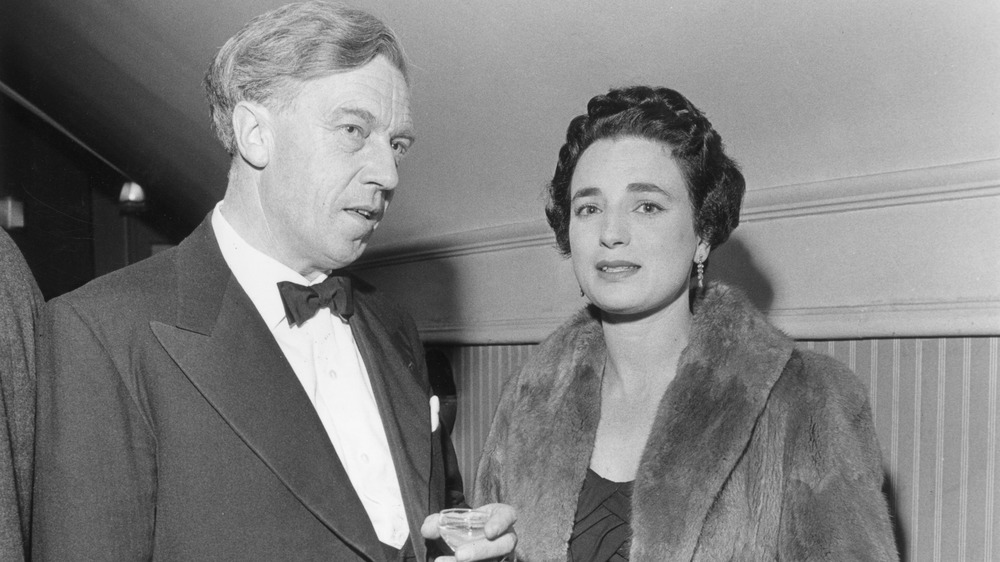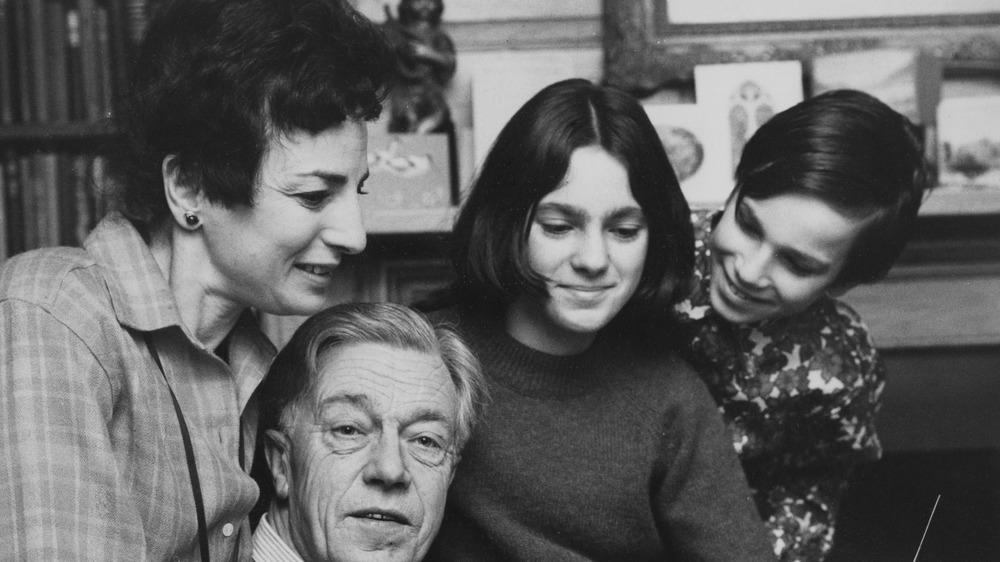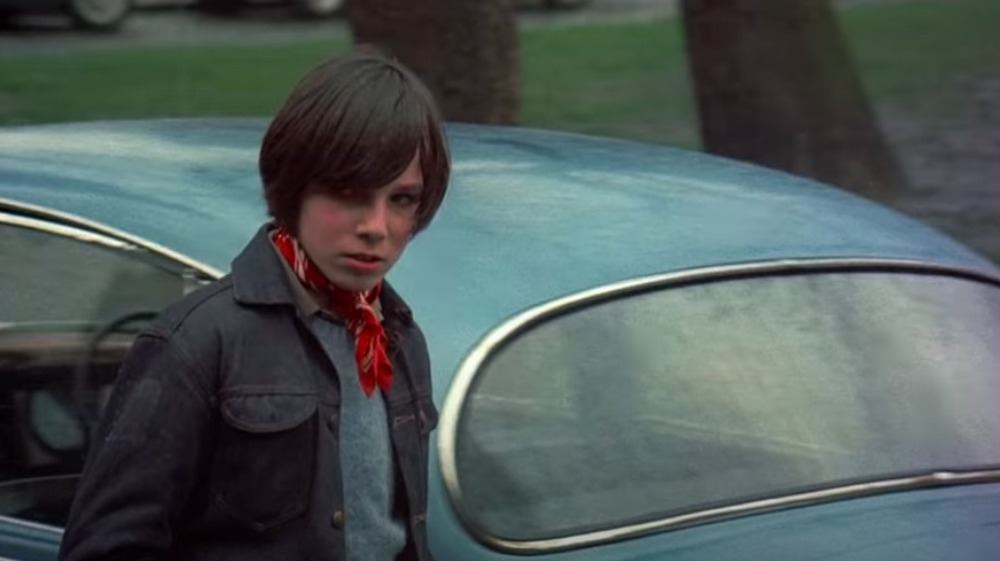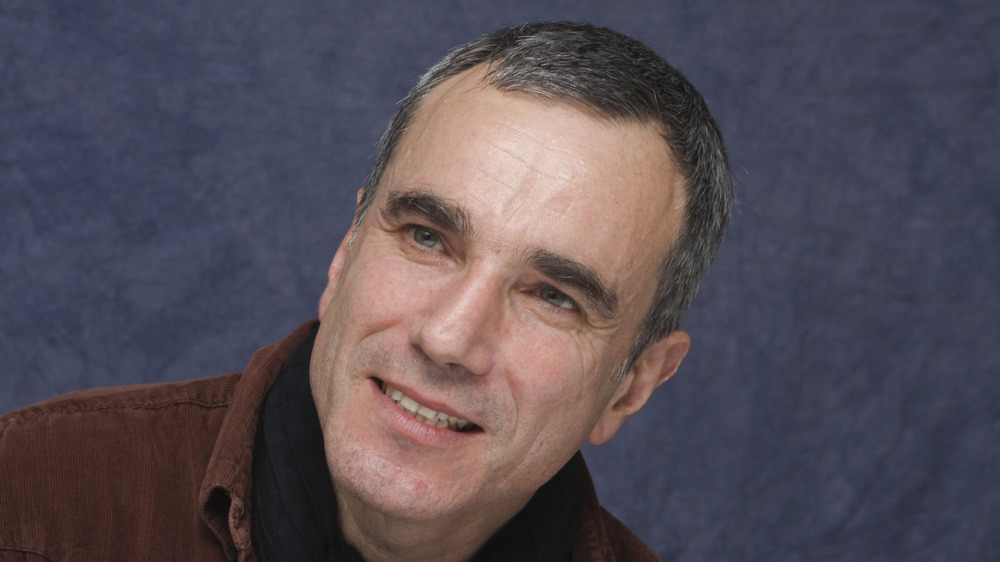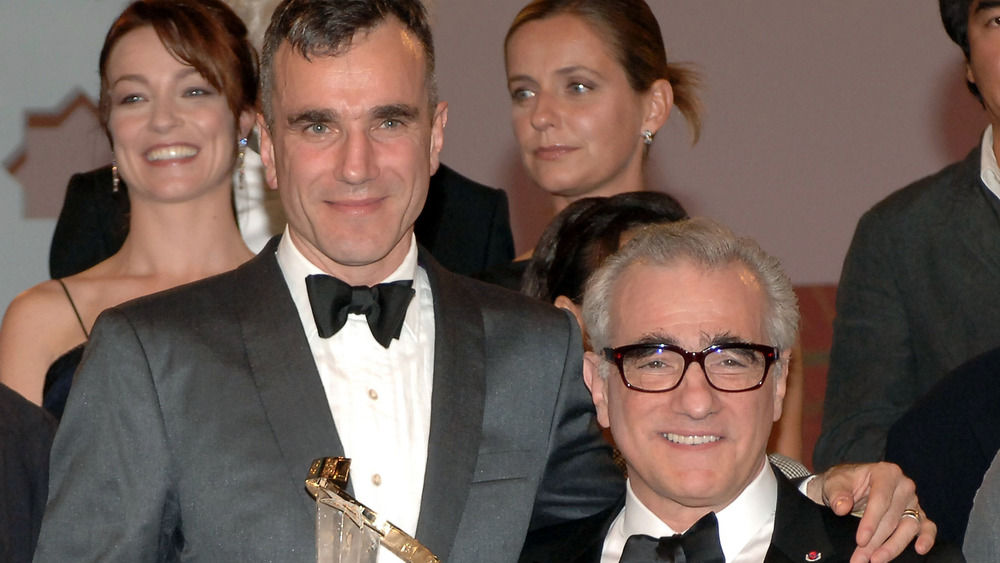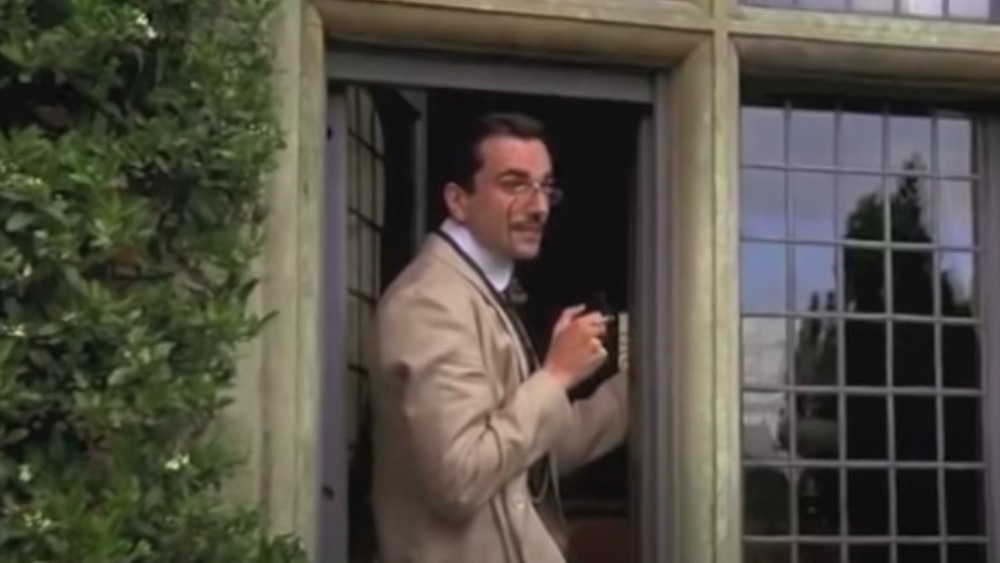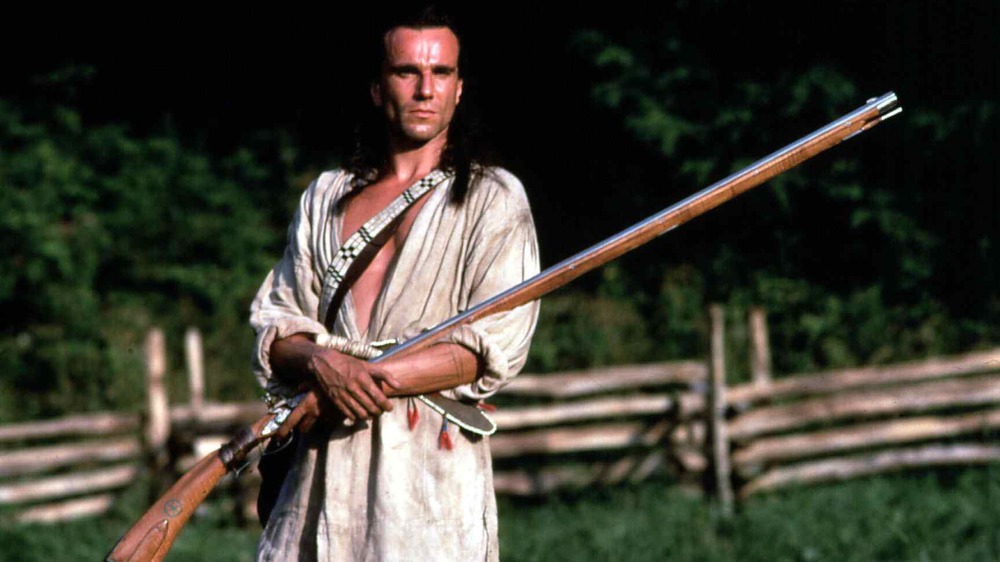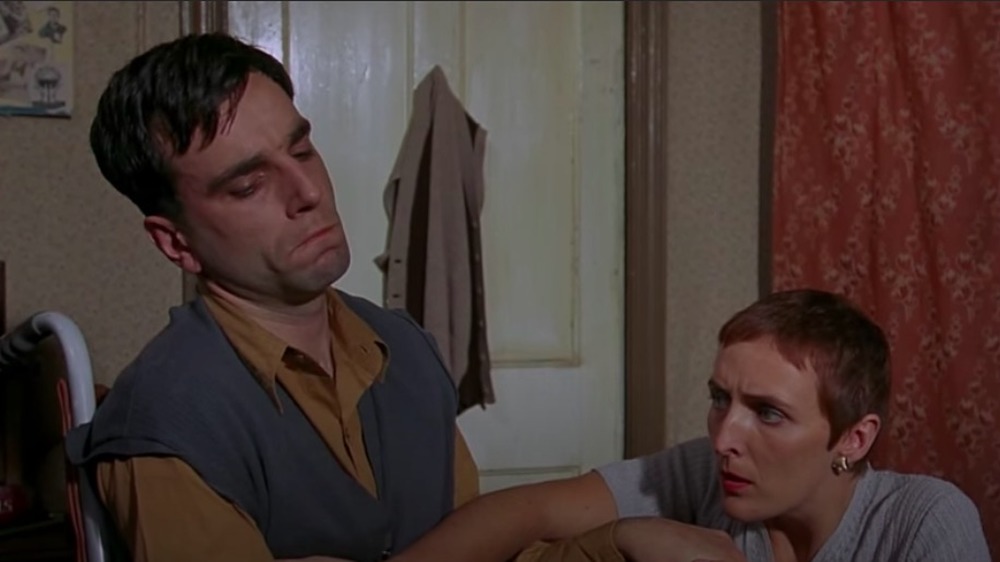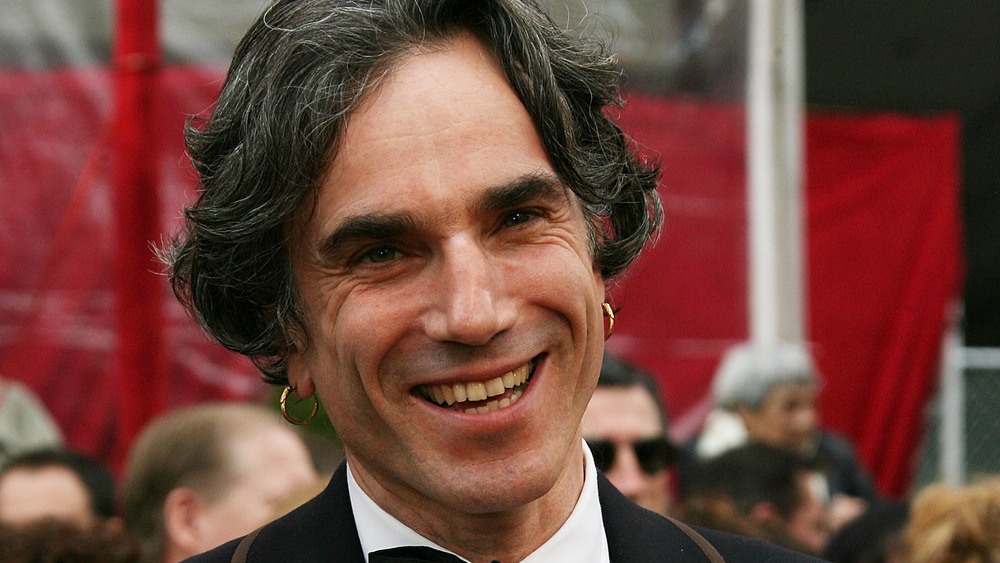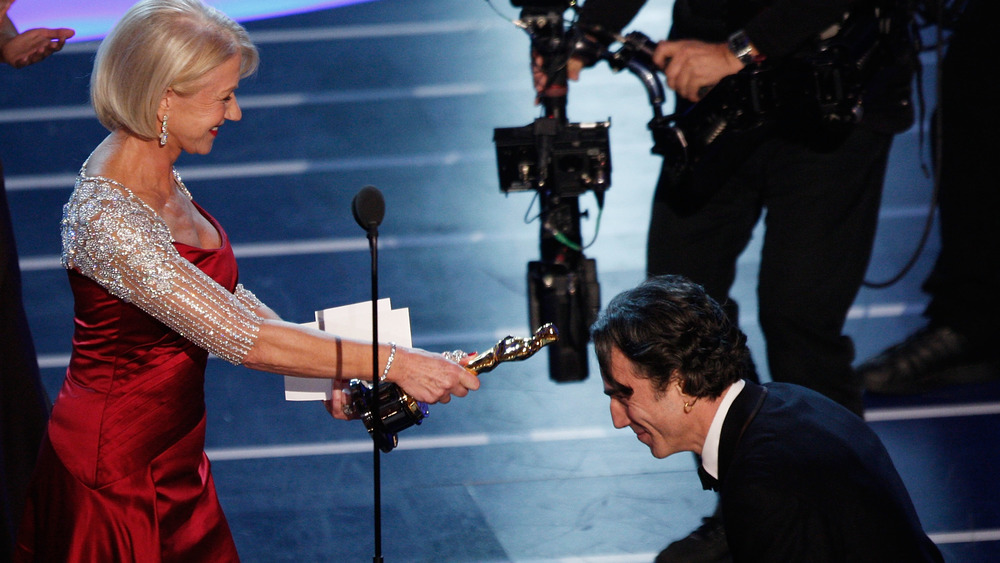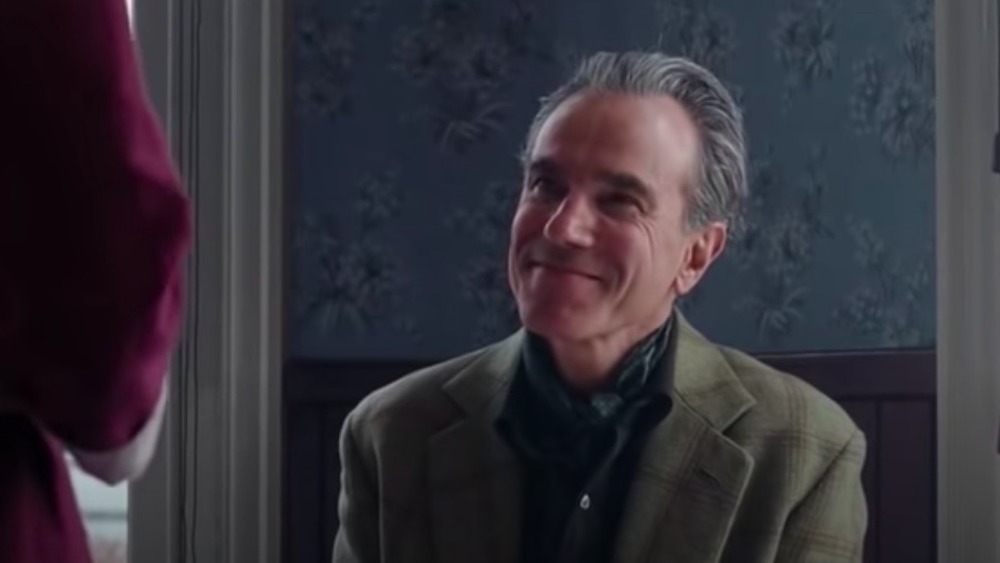The Untold Truth Of Daniel Day-Lewis
In 2013, for his performance of Abraham Lincoln in Steven Spielberg's Lincoln, Daniel Day-Lewis won his third Best Actor Oscar, making him the first to achieve that feat. The other two wins were for 2007's There Will Be Blood and 1989's My Left Foot. Along with his wins, he has three other nominations — and those are just for the Academy Awards. The list gets much longer when you delve into his BAFTA nods, Golden Globes recognition and more.
Already known as one of the best working actors of his generation, his reputation increased even more after his third Oscar win. USA Today speculated that, with that win, he became the greatest actor of all time. This argument only goes by awards won, which is not the only way to determine merit, as the piece also discusses. Regardless, Day-Lewis has delivered some amazing performances throughout his career, from his first lead role in My Beautiful Laundrette to his last film performance ever before his retirement in 2017's Phantom Thread.
As a man who has so beautifully encompassed so many other lives through his characters, it makes his own presence somewhat enigmatic. Here, we'll delve into the untold truth of Daniel Day-Lewis.
He comes from an acclaimed family, including his Poet Laureate father
Before Daniel Day-Lewis was being hailed as one of the best in his business, his father, Cecil Day-Lewis, was doing the same in his own industry: poetry. The elder Day-Lewis was considered one of the leading poets of his time and was appointed a Poet Laureate of Britain in 1968. In his lifetime, he published 12 poetry collections and three essay collections. He even published translations of classic works, such as The Aeneid. And on top of all of that, he published mystery novels under the pseudonym Nicholas Blake.
Upon his father's death in 1972, Daniel, along with his sister Tamasin, donated their father's archive — of letters, drafts and more — to Oxford University.
One of Cecil Day-Lewis's poems, "The Newborn," was written for his son Daniel shortly after his birth. The poem reads, "We time-worn folk renew/Ourselves at your enchanted spring,/As though mankind's begun/Again in you." When writing this poem for his newborn son, Cecil Day-Lewis had no idea his son would come to life more than once through all of his vivacious performances.
Acting ran in his family -- his mother was an actress
Day-Lewis shares the gift of storytelling with more than just his poet father — his mother, Jill Balcon, was an actress. Balcon's acting work ranged across movies, radio, television and the stage. Her film debut was in Alberto Cavalcanti's The Life and Adventures of Nicholas Nickleby, from 1947, in the role of Madeline Bray.
As a radio actress, her voice was described as "a rich, expressive, finely modulated instrument" and was "a favorite with listeners." It was through her work on the BBC radio program Time for Verse that Balcon met her future husband — and Day-Lewis's father — Cecil, when the two were to judge a verse-speaking competition.
Day-Lewis, especially in his earlier years, was asked about his famous parents and how their careers have affected his own career, if at all. In one interview, he stated, "I'm proud of my name and of my parents' achievements. I don't think having famous parents has been a source of pressure for me."
At 12, he ran away from school
As a 12-year-old, Day-Lewis attended a boarding school called Sevenoaks, but was, apparently, unhappy there, according to a story published in The Washington Post. He and a couple of friends ran away, going from train to bus to hitchhiking to get to their destination. That destination was another boarding school 50 miles away called Bedales, where his sister Tamasin attended. Their time there was short lived, however, as they were caught by members of the Bedales staff and sent back to Sevenoaks.
But it turns out that was not the end of the story. When the headmaster of Bedales heard about it, he was amused and suggested to Day-Lewis's parents that they let him enroll at Bedales and join his sister — and they agreed.
With a focus on the arts, Day-Lewis describes his time there as "paradise." There, he was able to hone his acting chops and participated in various school plays, including Shakespeare's The Winter's Tale.
His first role was a car vandal
John Schlesinger's Sunday Bloody Sunday, from 1971, was praised by critics and, while Day-Lewis had nothing to do with its acclaim, the film does mark his first appearance onscreen. His (uncredited) role is as a young car vandal — Day-Lewis was about 14 when the film came out — who keys a car with a broken bottle.
Day-Lewis described his memories of the experience while speaking to Interview Magazine. When talking about how he got involved, he said Schlesinger "chose three particularly unpleasant-looking" boys from a group of young footballers hired to play in the background to act in the car vandalizing scene. Hesitant to definitively call it his first film role, he added, "I was one of these. We were equipped with broken milk bottles and told to wreck a row of rather smart parked cars. It doesn't sound like film work to me."
Regardless, and uncredited or not, the actor's brief appearance has become a well known trivia fact of the film.
Day-Lewis could have been Vincent Vega
As a highly sought-after actor, Day-Lewis has turned down multiple parts offered to him, including Viggo Mortenson's character in The Lord of the Rings and Tom Hanks' role in Philadelphia. Ironically, Hanks beat Day-Lewis for the Best Actor Oscar for his work in Philadelphia (Day-Lewis was also nominated for In the Name of the Father). The list of films he turned down goes on with Interview with a Vampire, Shakespeare in Love, Sleepy Hollow and more all ending up on his pile of rejects. With this in mind, it seems that Day-Lewis would likely get any role he actually wanted — but this is not the case with Pulp Fiction, for which Day-Lewis had his eye on the role of Vincent Vega.
In an oral history of Quentin Tarantino's film for Vanity Fair, it was revealed that producers were against Tarantino casting John Travolta, who of course ultimately landed the role. Instead, Day-Lewis, who had read the script and wanted the part, was suggested as an alternative to Travolta — but Tarantino insisted. And, as we know, Tarantino won the disagreement and got to cast his first choice.
Day-Lewis's film heroes are just like yours
Whether going off award nominations (of which he has hundreds) or Rotten Tomatoes film scores (showing that eight of his 21 films have a rating higher than 90% and most of the rest have ratings over 80%), Day-Lewis is undoubtedly at the apex of the film industry. It is a likely assumption that many aspiring actors look up to him and may even call him a hero of theirs.
As for Day-Lewis's film heroes? They're actually pretty classic choices within the world of Hollywood. In a discussion with Interview Magazine from 1988 (and republished in 2017), Day-Lewis was asked who his heroes are. He cited actors Spencer Tracy, Montgomery Clift and Marlon Brando, saying, "How can you not worship Brando?" He went on to add a few more actors, including Meryl Streep, Katharine Hepburn, and Sissy Spacek.
As for directors, he cited none other than Martin Scorsese, stating, "I admire Scorsese very much — why pretend otherwise? Of course I'd like to work with him." And he did — in 1993, Day-Lewis starred in Scorsese's The Age of Innocence, while in 2002, they collaborated again with Gangs of New York.
He got to choose his own role in A Room with a View
James Ivory's A Room with a View follows a young Englishwoman, Lucy Honeychurch (Helena Bonham-Carter), who is touring Italy. While in Florence, she meets George Emerson (Julian Sands) and is interested in him, but still considers settling down with Cecil Vyse, played by Day-Lewis, back in England. George comes back into her life and Lucy must decide between him and Cecil — and she chooses George.
Day-Lewis, in early pre-production of the film, actually got to choose which of the two lead men he wanted to play. Ivory asked Day-Lewis which of the two he saw himself as, the charming and alluring George or the respectable yet snobbish Cecil. Day-Lewis told the New Yorker, "I said no one in his right mind would ever admit to seeing himself as Cecil, and I'd rather play him than be him, understand what it is to be that man and thereby avoid the possibility of ever being him."
Day-Lewis went on to describe the ways in which he saw underneath the character's hard, pompous shell, giving an inside look into how he delved into the role of Cecil. He said, "I knew what he was going through — he couldn't open his mouth without alienating people, that's all. There was a person alive underneath all that who was desperate and anxious and insecure enough to be incredibly arrogant, and in the end he could never make contact, so he was terribly lonely."
He commits to the time period for his roles
It is no secret that Day-Lewis is a hardcore method actor. For his many period pieces, Day-Lewis has taken his method acting to a level where he commits to the way of life during whatever time period he is filming.
For example, he starred in The Last of the Mohicans, which focuses on a Native-American tribe during the French and Indian War. The film takes place during 1757 and one of the ways that Day-Lewis got into the mindset of the time was by learning how to survive while living in the wilderness. He learned to trap and skin animals, make fires and become a natural with a rifle (including firing while running).
For The Crucible, about the Salem witch trials, Day-Lewis didn't bathe. According to the Guardian, he lived in a house of the time period during filming, which didn't have electricity or running water. During production of Gangs of New York, Day-Lewis caught pneumonia after refusing to wear a bigger coat that wouldn't have existed in 1846. And for In the Name of the Father, he lived on prison rations (leading to his weight loss of 30 pounds for the role) and spent time in isolation to mimic the experience of a jail cell.
His method acting also includes language and mobility
Day-Lewis's techniques to get into character exceed his commitment to time periods. In 1988, he starred as Tomas in The Unbearable Lightness of Being, which takes place in Czechoslovakia. For the part, Day-Lewis actually learned the Czech language. Considering this film's dialogue is in English, while only taking place in Czechoslovakia, this is definitely an impressive "above and beyond" move. He nailed the accent as well, to go along with his grasp of the language.
He also insisted on staying in character while filming My Left Foot – which meant not leaving his character's wheelchair. In the biopic, he plays Christy Brown, an Irish man who was born with cerebral palsy, with control of only his left foot. He eventually becomes a successful artist and writer. According to Fandor, Day-Lewis spent several weeks at a cerebral palsy clinic to learn the details of Brown's everyday life. He also remained in his wheelchair during filming, meaning that crew members occasionally had to carry him around. Plus, he, of course, learned to use his left foot in the same way that Brown did, meaning that the scenes in the film depicting this are all Day-Lewis.
He quit his run as Hamlet with just seven performances left
Adding his name to a list of renowned actors from Richard Burton to David Tennant, Day-Lewis took on the role of Hamlet. In 1989, at age 32, Day-Lewis acted in the famous tragedy at the Royal National Theatre in London. But with just seven performances left to go, he had to exit the production, citing "nervous exhaustion." He even had to leave the stage mid-performance due to feeling ill, leaving the understudy to take over the rest of his scenes.
In an interview while still playing the part, Day-Lewis said, "This has certainly taken me closer to the abyss than anything else. And I've discovered fears in myself, or generated fears, I never knew before — and once they're there, they're very difficult to put away again."
Considering how much of himself he puts into his roles, it's no surprise he was overcome with exhaustion at least once in his acting career. Even director Richard Eyre commented that Day-Lewis gave "his whole heart, mind and body."
He was knighted in 2014
Back in 2008, while accepting his Best Actor Oscar for There Will Be Blood, Day-Lewis knelt before presenter Helen Mirren on stage before accepting the award; at the microphone, he said, "That's the closest I'll ever come to getting a knighthood, so thank you." His joke was referring to Mirren having played Queen Elizabeth in The Queen in 2006. As it turns out, this wasn't the case, as Day-Lewis received his knighthood from the actual royal family just six years later.
At age 57, the Oscar winner officially became Sir Daniel Day-Lewis. In June of 2014, he was knighted for his services to drama. A part of the Queen's Birthday Honour's List, he was knighted by Prince William, Duke of Cambridge, at Buckingham Palace.
Day-Lewis stated that he was "entirely amazed and utterly delighted in equal measure" about receiving the knighthood. Knowing Day-Lewis is now a knight sure makes the Oscar clip from 2008 even more charming.
He retired in 2017
In 2017, just about five months before the release of his final film Phantom Thread, Day-Lewis announced he would be retiring from acting. His statement communicated that he "is immensely grateful to all his collaborators and audiences over the many years." He also cited it as "a private decision" and said he would make no further comment.
A few months after the statement, however, he opened up to W Magazine about his decision to leave acting behind him. Day-Lewis, during the interview, had a hard time defining exactly what made him quit acting, but discussed no longer finding value in his work. He said, "If an audience believes it, that should be good enough for me. But lately it isn't."
He also spoke of his decision to make a public statement about the retirement, explaining that he needed to be firm in his stance and "didn't want to get sucked back into another project." He then added, "Now, I want to explore the world in a different way."
